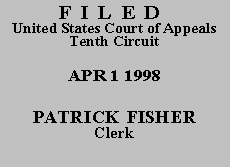

| RICHARD GASCHLER,
Plaintiff-Appellant, v. SCOTT COUNTY, KANSAS; SCOTT COUNTY BOARD OF COMMISSIONERS; FLOYD KREBS, JIM MINNIX, RICHARD RAMSEY, individually and in their capacity as Scott County Commissioners; ALAN STEWART, individually and in his official capacity as Scott County Sheriff; R.W. MITCHELL, PAUL STRICKERT, MARK KUHLMAN, individually and in their capacity as Deputies of the Scott County Sheriff's Department; KENDALL THOMAS; GORDON GOERING, District Magistrate Judge of the 25th Judicial District Court at Scott County, Kansas, in his official capacity and individually; JOHN SHIRLEY, individually and in his capacity as the Scott County Attorney, Defendants-Appellees. |
|
Plaintiff appeals the district court's grant of summary judgment in defendants' favor on his 42 U.S.C. § 1983 claims and his various other state law claims.(1) Plaintiff complained of several violations of his constitutional rights and of state law arising from an arrest, a subsequent care and treatment commitment proceeding, a later arrest pursuant to a warrant, and initiation of judicial proceedings against him. The district court has thoroughly and accurately stated the relevant facts, and we will not repeat them here.
We review the district court's grant of summary judgment de novo, viewing the evidence in the light most favorable to plaintiff. See Thomas v. Wichita Coca-Cola Bottling Co., 968 F.2d 1022, 1024 (10th Cir. 1992). We apply the same standard as the district court, and we will affirm if there is no dispute as to any material fact and if defendants are entitled to judgment as a matter of law. See id. We have reviewed the record, and we agree with the district court that summary judgment is appropriate. The district court's memorandum and order granting summary judgment is thorough and its analysis is sound. We affirm for substantially the same reasons set forth in that order. We will briefly address the arguments raised on appeal that we can discern from plaintiff's brief.
We agree with the district court that plaintiff's claims brought pursuant to 42 U.S.C. § 1983, regarding his arrest on March 11, 1992, are barred by the applicable statute of limitations. Those claims are subject to the two-year limitations period in Kan. Stat. Ann. § 60-513(4). See Baker v. Board of Regents, 991 F.2d 628, 630 (10th Cir. 1993). This action was filed on April 8, 1994. The district court was correct in determining that, even if Kan. Stat. Ann. § 60-515(a) were applied as plaintiff argues, his claims would not be timely. That statute does not toll the limitations period, it merely provides that one under a legal disability at the time a cause of action accrues is allowed one year from the time the disability is removed to bring the action. Even assuming plaintiff was under a legal disability for as long as he says, which is contrary to the evidence, one year from the removal of the disability was before the expiration of the § 1983 two-year limitations period. Plaintiff's argument does not save his § 1983 claims. Therefore, plaintiff's excessive force and wrongful arrest claims are time-barred. Similarly, to the extent plaintiff is arguing his state law claims of malicious prosecution, assault and battery, and false arrest/imprisonment on appeal, we agree with the district court that those claims are barred by the one-year limitations period, see Kan. Stat. Ann. § 60-514(b), and plaintiff's failure to comply with Kan. Stat. Ann. § 12-105b(d).
Regarding plaintiff's claim of malicious prosecution, the district court was correct in finding that plaintiff could not show an essential element of that claim, i.e., that defendants acted without probable cause and with malice. The record contains sufficient evidence to establish probable cause for prosecution of both the care and treatment case and the criminal case. See Taylor v. Meacham, 82 F.3d 1556, 1561 (10th Cir.), cert. denied, 117 S. Ct. 186 (1996) (holding that the common law elements of malicious prosecution are the starting point for § 1983 malicious prosecution claim); Burney v. Kansas Dep't of Social & Rehabilitation Servs., 931 P.2d 26, 32 (Kan. Ct. App. 1997) (noting that one of the elements of malicious prosecution claim is that the action was initiated without probable cause). The fact that the criminal charges were eventually dismissed does not establish there was no probable cause to file the charges.
The judgment of the district court is AFFIRMED. The mandate shall issue forthwith.
ENTERED FOR THE COURT
PER CURIAM
*. This order and judgment is not binding precedent, except under the doctrines of law of the case, res judicata, and collateral estoppel. The court generally disfavors the citation of orders and judgments; nevertheless, an order and judgment may be cited under the terms and conditions of 10th Cir. R. 36.3.
1. Plaintiff repeatedly states in his brief on appeal that his attorney failed to respond to defendants' motion for summary judgment in the district court. Plaintiff filed a Statement of Controverted Facts in response to defendants' motion. That pleading did respond to the motion, and the district court clearly considered it as such.